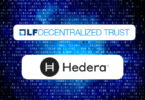Yesterday it was announced that SK Telecom integrated its blockchain mobile identity solution Pass with the Samsung Blockchain Keystore, a feature of Samsung mobile phones.
South Korea’s big three mobile operators are part of the Initial DID self-sovereign identity alliance. At the end of June, the three telecoms firms, SK Telecom, KT and LG U+, launched a mobile blockchain identity app, “Pass”, based on driver’s licenses. By August 9th, the National Police Agency and Road Traffic Authority said there were more than a million subscribers.
Se-Hyun Oh, head of SK Telecom’s Blockchain/Certification Business Division, said, “‘Initial’ is a service that allows users to safely and conveniently verify their identity and qualifications online, and to manage personal information directly, and has been rapidly growing since Corona 19.”
The app can be used for numerous purposes, including to prove someone is old enough to buy tobacco or alcohol without revealing the details in the driver’s license. Another application is to renew driver’s licenses and so far, it’s being used at 27 driving test centers. In the second half of the year, it’s likely to be rolled out for traffic stops with car rental companies also showing an interest.
Meanwhile, Samsung phones have a Blockchain Keystore area. This is a special area where private keys can be stored, and is not available to the rest of the Android operating system, making keys much harder to steal. Hence the integration with the Pass app helps to enhance security.
Apart from the three telcos, Samsung is also a member of the Initial DID Alliance along with KEB Hana Bank, Woori Bank, NH Bank, Shinhan Bank, Hyundai Card, BC Card and IT company Koscom and its subsidiaries. The alliance was unveiled just over a year ago, and NH Bank was the first to unveil a commercial application. It has the support of the Ministry of Science and ICT and the Korea Internet & Security Agency (KISA).
In addition to driver’s licenses, the alliance plans to extend it to student IDs and employee IDs and is planning applications this year across finance, health, and education with 30 types of electronic certificates targeted.
Meanwhile, there are multiple significant digital identity initiatives in South Korea. Others include the DID Alliance, one from the Korea Financial Telecommunications and Clearings Institute (KTFC) and ICONLOOP.






